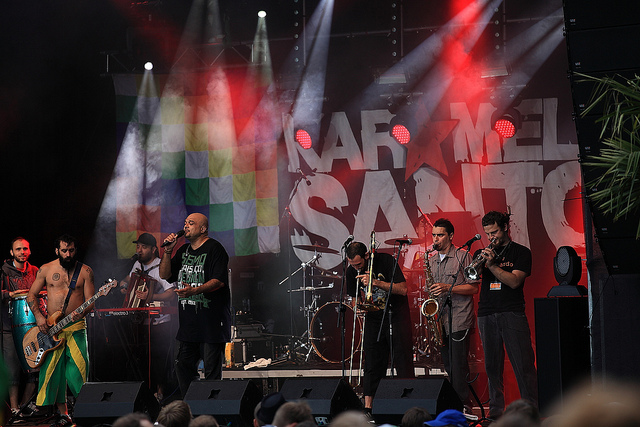
“¡Macri, compadre, la concha de tu madre!”
Karamelo Santo were at the Niceto on Friday night, playing in Buenos Aires for the first time in two years. A friend took me to see them; we stood at the back, passing a plastic pint glass of cold beer back and forth, nodding heads and swaying hips to the beat.
Until the band, mid-set, began to drum up a little casual call-and-response Macri-bashing. The rough translation is “Macri, comrade, your mother’s naughty bits!”
Mauricio Macri, for those who are blissfully unaware of the tortured intricacies of Argentine politics (#jealous), is the Mayor of Buenos Aires, aspirant to the presidency in 2015 – yes, we’re already talking about this instead of, you know, governing the country – and President Cristina Fernández de Kirchner’s current enemy #1. The two recently allowed a spat over the city’s subway system to deteriorate into a ten-day strike, causing chaos city-wide. Do click on that link: it’s an excellent run-down of what was a stellar example of the total lack of dialogue endemic in Argentine politics.
I was on holiday in Peru and missed it all, thank heavens.
“¡Macri, compadre, la concha de tu madre!”
This came after a brief appeal for funds, for what is no doubt a commendable social project, in one of the city’s many villas (the bonaerense equivalent to Rio’s favelas and Lima’s pueblos jóvenes). A collection box started doing the rounds, and I shifted uncomfortably as the band launched into another song. I stared straight ahead, wondering if I should say something to Juan or not. Until he looked at me, flabbergasted, and we both launched into the same diatribe at the same time.
The night ruined, the buzz gone, we spent hours dissecting the line between art and politics. I love a good protest song as much as the next person, and strongly believe that artists and musicians have as much right to voice and act on their political opinions as the next person.
Still, this gives them a much bigger soapbox than your average citizen, and I think this privilege, like all privilege, comes with a hefty dose of responsibility. The deeply depressing thing about Argentine politics, for me, is that it is mostly just a competition to see who can shout the loudest. Local politics – Macri’s domain – should be about convivencia, living together, and every citizen’s voice should be heard and respected, even if not agreed with. Karamelo Santo have every right to voice their disapproval of his policies in a reasoned and reasonable manner, but not to cheapen an already corrupted, aggressive and intolerant discourse.
As musicians, I think it incredibly disrespectful to their fans to immediately exclude those who think differently than they do, and not on the grand themes of peace, social justice, environmentalism (dear, no doubt, to the entire audience), but on the complex, nitty gritty of attempting to manage an enormous, diverse city. The grey shades don’t lend themselves to catchy slogans.
Juan, proud Argentine that he is, was even more horrified than I and used the word “fascism” more than once. I’m disinclined to jump on that bandwagon, mostly because it’s such a pejorative, conflictive term that I think it can only contribute to the further polarization of Argentine society. No need to throw any more gasoline on that bonfire. Still, as the crowd chanted back in unison, I felt distinctly uncomfortable, and very depressed for the near future of this lovely country.
